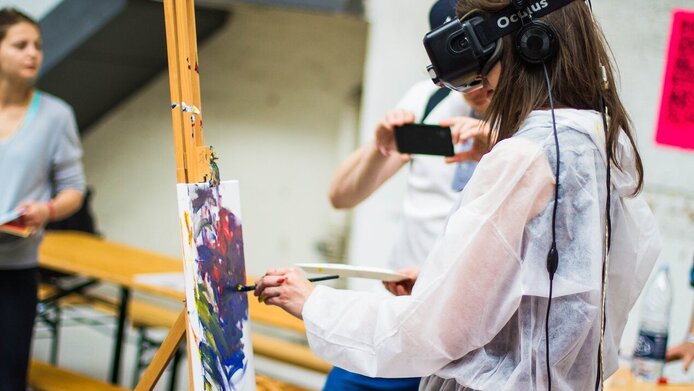The next industrial revolution is here. What does this mean for Austria?

For quite some time, digitalisation has encompassed all walks of life and fundamentally transformed our daily lives. While we have not seen an economic crisis triggered by the use of machinery that eliminates jobs, which many had expected, the next transformation is already imminent. Smart machines that communicate with each other are predicted to bring about an even more profound social change. In a project funded by the Austrian Science Fund FWF, a team headed by economist Heinz Dieter Kurz is exploring the potential nature of such change and what it means for a country like Austria.
Technologies with enormous impact
“The new information and communication technologies are categorised among the so-called general purpose technologies,” explains principal investigator Heinz Dieter Kurz. Examples from history include the bicycle, the steam engine or electricity. “They are characterised by the fact that they can increase labour productivity very significantly and have a very wide range of possible applications. In other words, they affect the entire economic and social system. They are also marked by a great inherent potential for further technological inventions.” According to Kurz, technologies of this kind, GPT for short, have enormous consequences: “They affect the economy as a whole and thus also the established structures within it.” Therefore, it is insufficient to take a one-dimensional approach to such far-reaching developments. “We employ multiple methods. The issue is neither purely technological nor purely economic, but also includes socio-economic and cultural aspects. These technologies transform the entire system, leaving no stone unturned,” Kurz emphasises.
Old knowledge is crowded out
Kurz speaks of “creative destruction” in this context. “The term was coined by the great economist Joseph Schumpeter. He taught in Graz for a while and was Minister of Finance in Austria before he ultimately moved to Harvard University. He was among those responsible for Harvard's world fame in the economic sciences,” Kurz notes. “Creative destruction” refers to the fact that new knowledge that materialises in certain products is not simply added to stand alongside the old, but replaces the old. “As a rule, such events are not beneficial to all members of society, but only to some, while they may be of great disadvantage to others,” Kurz explains. According to Kurz, the current development of the IT industry is a clear example of this process. He points out the important role that policy makers have to play here: “The Internet and many other currently important technologies in the information and communication sector were originally created with the help of government subsidies.” This shows that policy makers could certainly intervene and take on the role of a quasi-entrepreneur.
Impact on Austria
Among other things, Kurz and his team use network-analysis instruments and model-based empirical analyses to find out how Austria can respond to such a change. Their results suggest that with a view to its transformation capabilities in respect of the digital revolution, Austria is in the stronger midfield in an international comparison. The leaders are other countries, however: “The special feature of these technologies is that almost monopoly-like institutions have emerged in the USA, but in the meantime also in China,” says Kurz who feels that a small, knowledge-based country like Austria cannot do much apart from occupying niches. “No information and communication technology giant will emerge in this country,” says Kurz and emphasises that this applies more or less to Europe as a whole. “In this context, the EU is belatedly trying to keep up with international competition. One may wonder whether the cost of building our own European IT industry might not be too high.” Austria is very strongly integrated into the European research network ECSEL in individual fields, for instance in the development of micro- and nano-electronic components and systems. In this area, Austria can play an important role. But the central need is for a political strategy. “There is a polarisation hypothesis saying that better qualified workers can greatly improve their chances if they are able to handle the new technologies,” notes Kurz. Routine work will be increasingly rationalised away by artificial intelligence, although so far this effect has not been as strong in Austria as had been expected. “But that can change very quickly,” Kurz points out.
Mistakes have long-term consequences
Heinz Kurz calls on policy-makers to see to it that the state meets its entrepreneurial tasks: “My personal impression is that Austria is not sufficiently alert in this respect.” Kurz thinks that one might see an unprecedented level of segregation in society. Schools should be provided with hardware and digital education should be strengthened: “I know quite a few families with several children who have only one computer,” Kurz says. The pandemic shows up the problem in a particularly drastic fashion in respect of home schooling needs. Corona accelerates the inequalities in education. “This has long-term consequences one can hardly fathom.” As of now, the problems are not yet acute. “We do not yet see greater unemployment caused by technological innovations,” Kurz notes. Nevertheless, time is pressing. “There will be redundancies. The question is how many new jobs will be created. And that will depend largely on economic policy,” Kurz predicts.
Personal details Heinz Dieter Kurz is an economist and former director of the Schumpeter Centre he founded at the University of Graz. The researcher, who has received many international awards, is interested in economic theory, but also in the history of economic thought. He is the author of numerous specialist textbooks and popular writings on economics, and is also a contributor to renowned daily newspapers. Funded by the Austrian Science Fund FWF with around 400,000 euros, the research project “How ‘smart machines’ are transforming the Austrian economy” will run until April 2021.
Publications





